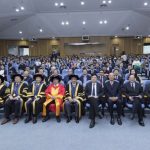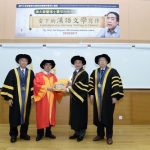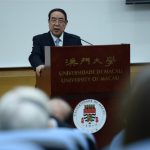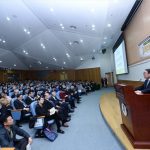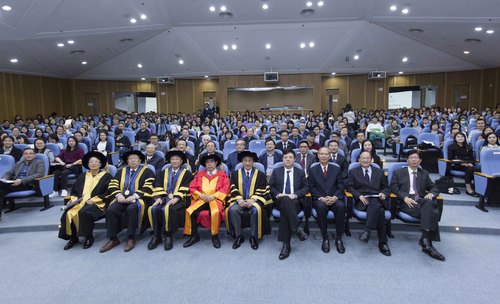 Group photo
Group photo
The University of Macau (UM) today (22 March) conferred a degree of Doctor of Letters honoris causa on the renowned writer Jia Pingwa, in recognition of his outstanding contributions to contemporary Chinese literature. Following the ceremony, Jia gave a Doctor honoris causa Lecture, titled ‘Contemporary Literary Writing in Chinese’, which attracted a full-house audience composed of UM faculty, students, and members of the public. Even the aisles were packed with people.
Tam Chon Weng, Secretary for Social Affairs and Culture and representative of Chief Executive and UM Chancellor Dr Chui Sai On, presented the honorary doctorate to Dr Jia in the company of UM’s University Council Chair Lam Kam Seng and UM Rector Wei Zhao, amid thunderous applause from the audience. Rector Zhao said that Chinese literature is one of the key disciplines at UM, as every world-class university should have a world-class academic programme focused on the native language of the country in which the university is located.
In recent years, the Department of Chinese Language and Literature has made considerable progress with the support of various parties. The department now boasts a faculty team of renowned experts and scholars. Earlier, it signed a collaboration agreement with its counterparts at Taiwan University, Peking University, and the University of Hong Kong, on jointly establishing an international academic platform. These achievements are closely related to the team of honorary doctors composed of such literary masters as Wang Meng, Mo Yan, Yu Kwang Chung, Jin Yong, and Pai Hsien-yung. The addition of Dr Jia will further increase the influence of the team and benefit the future development of Chinese discipline at UM.
Hong Gang Jin, dean of the Faculty of Arts and Humanities, read the citation for Jia Pingwa. The citation said that Jia is a renowned writer with great talent, energy, and charisma. His name and works are destined to be tied together with his time. Jia is a writer of the new age, with boundless talent writers from older times could only dream of. Using the rich historical and cultural heritage as his canvases, he has painted an impressive landscape of the contemporary China and the admirable stories of its people. His works are brimming with breathtaking creativity. Hailing from Shaanxi province, he presents the resilience, brilliance, and nobility, as well as the dust-covered fragility, lethargy and nothingness that are at the core of the Chinese culture in the fascinatingly unpredictable way of a magician. His works, no matter how imaginative, are unfailingly rooted in reality, which gives him an almost Heracles-like strength. This strength endowed him with the greatest charisma a writer can ever hope to attain as well as an enormous cultural influence.
At the lecture following the ceremony, Jia shared his insights on the current development and future of contemporary Chinese literature in his unique Shaanxi dialect. He believes that writers should think independently in an age fraught with big changes, because a writer without modern, independent thinking would have difficulty gaining a foothold or creating works that deserve a place in the readers’ bookshelf or history. He also thinks that writers need to look at society with fresh eyes against the new backdrop of a fast-developing world. ‘My heart aches for the rapidly declining countryside. Should I sing a eulogy or an elegy? I am not sure,’ he bemoaned.
Prof Zhu Shoutong, head of the Department of Chinese Language and Literature, chaired the Q&A session. The audience was very enthusiastic and asked many questions in Shaanxi dialect, Cantonese, and Mandarin. Dr Jia patiently answered every question from the audience. Rector Wei Zhao also participated in the Q&A session, which was punctuated by laughter and applause. In concluding the Q&A session, Prof Zhu highly praised Jia’s talk, saying that Jia accurately presented the dilemma between literature and time, as well as the dilemma between writers and reality, quoting a line from Li Sao by Qu Yuan, ‘This is his blood, his tears, his book of confessions.’
The Department of Chinese Language and Literature will hold a seminar on Jia Pingwa’s works on Thursday 21 March, in Room G010, Faculty of Business Administration (E22). The seminar is co-organised by the Department of Chinese Language and Literature, the Macau Association of Literary and Artistic Critics, UM’s Research Centre for Humanities in South China, and a celebrity forum organised by the Department of Chinese Language and Literature. It will begin at 9:30am. All are welcome.
View gallery

